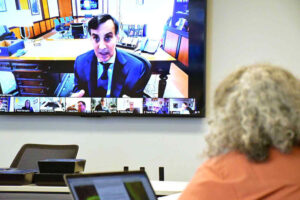Johns Hopkins University President Ronald Daniels outlined four ways in which colleges and universities can work to reinvigorate democracy and to renew its promise during a book talk co-hosted by several organizations at UNC-Chapel Hill.

More than 100 participants joined the online talk, which focused on the arguments Daniels raises in his newly published book, What Universities Owe Democracy.
Chancellor Kevin Guskiewicz welcomed Daniels and noted similarities between Carolina—the nation’s oldest public institution of higher education—and Johns Hopkins, a private university in Baltimore, Maryland. Johns Hopkins is often considered to be the nation’s first research university.
“Higher education and democracy have been closely linked since the earliest days of the American experiment,” Guskiewicz said. “In the midst of a global pandemic, a renewed reckoning around racial justice and inequality, and deep questions about how democracy and pluralism will thrive in an era of huge disruption, President Daniels’s insights in conversations like this one are vital.”
During his talk, Daniels emphasized ways to advance social mobility, to teach students and the public about the values of robust democratic citizenship, and to bring people from a variety of backgrounds together to engage across differences.
“Universities need democracy to thrive and to flourish,” Daniels said. “Universities should work harder at fostering a stronger culture of debate and dialogue on our campuses.”
Daniels said often public universities are at the center of political crosshairs, and he offered many ways to strengthen the ideals of democracy. Part of this work includes a commitment to model productive debate, especially among those from diverse life experiences and backgrounds.
“Perhaps we should start not by pointing fingers but do the work to make sure they know how to live alongside each other and speak about difficult issues in our society,” Daniels said.
Daniels also spoke about increasing diversity of the student body in order to foster democracy—a complex issue involving admissions processes, opportunities for financial aid, and pipelines to higher education.
“Higher education is both a public and private good that knits our society together,” Daniels said. “Liberal democracy is premised, in part, on the notion that all people should have the opportunity to climb the economic ladder on the basis of their aptitudes, efforts, and ambitions.”
Daniels said the share of the world’s population living in democracies has decreased over the last several decades; more countries are heading toward autocracy than in generations before.
Part of promoting democracy, Daniels said, is the recognition that colleges and universities are central to discovering new knowledge and lines of inquiry, but that work must be done to bring knowledge to the public it was meant to serve. He said research generated by the COVID-19 pandemic provides an opportunity to embrace these ideals to remain a vital and reliable public resource.
“This is a moment that calls for openness and transparency as a way of burnishing trust with the public,” Daniels said.
The Royster Distinguished Professor Tori Ekstrand, from the Hussman School of Journalism and Media, moderated a question-and-answer session. During the session, Daniels fielded questions on hiring faculty of color and how to reimagine pipelines to STEM-based Ph.D. programs for underrepresented students.
“We’re compromising the future competitiveness of this country,” Daniels said. “It means we have to try new things and examine how we develop these pipelines.”
While Daniels said budget constraints are representative of college and university priorities, he said fostering democracy goes beyond a budget line.
“What’s really needed are good ideas and a willingness of universities to experiment and to meet this moment,” he said. “Every core democratic institution, I believe, has an opportunity to step up.”
Suzanne Barbour, dean of The Graduate School, said graduate students are foundational to this work.
“Our public University is at the forefront of how North Carolinians shape knowledge, drive innovation and research, and engage in the marketplace of ideas,” she said. “And graduate students are key participants in those conversations.”
Daniels has served as president of Johns Hopkins since 2009 and has focused on several key areas, including interdisciplinary collaboration in research and education, enhancing student access to higher education, and supporting social and economic innovation. He holds a Master of Laws from Yale University, received his JD and undergraduate degree from the University of Toronto.
Several organizations on campus co-hosted the talk, including The Graduate School and its Royster Society of Fellows, the Institute for the Arts and Humanities, the Program for Public Discourse, the Carolina Seminar Higher Education Working Group, and the Democracy Initiative with Carolina Next: Innovations for Public Good.
